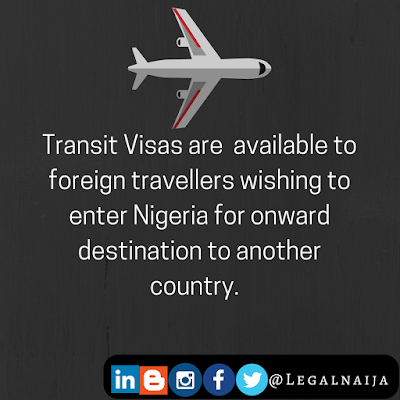
Doing Business In Nigeria – Immigration Visas And Their Tax Implications (Part 1)

INTRODUCTION
The
mobility of foreigners in and out of Nigeria for whatever purpose is generally
subject to visa and permit requirements. The only category of persons exempted
from visa and permit requirements are nationals of Member States of the
Economic Community of West African States (“ECOWAS”). By section
37(13) of the Immigration Act, 2015(“the Act”) and Regulation 5(9)
of the Immigration Regulations, 2017 (“the Regulations”) made by the
Minister of Interior pursuant to section 112(1) of the Act, such nationals
of Member States of ECOWAS are exempted from not only obtaining entry
visas/permits but are also allowed to reside, work and undertake commercial and
industrial activities within Nigeria provided however that they register with
the Nigerian Immigration Service (“the NIS”) and obtain residence
cards from the NIS.
mobility of foreigners in and out of Nigeria for whatever purpose is generally
subject to visa and permit requirements. The only category of persons exempted
from visa and permit requirements are nationals of Member States of the
Economic Community of West African States (“ECOWAS”). By section
37(13) of the Immigration Act, 2015(“the Act”) and Regulation 5(9)
of the Immigration Regulations, 2017 (“the Regulations”) made by the
Minister of Interior pursuant to section 112(1) of the Act, such nationals
of Member States of ECOWAS are exempted from not only obtaining entry
visas/permits but are also allowed to reside, work and undertake commercial and
industrial activities within Nigeria provided however that they register with
the Nigerian Immigration Service (“the NIS”) and obtain residence
cards from the NIS.
However,
the types of visas or permits which foreigners wishing to visit Nigeria for
whatever purpose are required to obtain together with the tax implications of
these visas and permits will now be considered in details.
the types of visas or permits which foreigners wishing to visit Nigeria for
whatever purpose are required to obtain together with the tax implications of
these visas and permits will now be considered in details.
TYPES
OF NIGERIAN VISAS/PERMITS AND THEIR FEATURES
OF NIGERIAN VISAS/PERMITS AND THEIR FEATURES
By
the combined provisions of the Act, the Regulations and the guidelines issued
by the NIS from time to time, one of the following visas/permits (generally
available to foreign nationals of non ECOWAS countries) shall be obtained by
any foreigner seeking to enter Nigeria for whatever purpose:
the combined provisions of the Act, the Regulations and the guidelines issued
by the NIS from time to time, one of the following visas/permits (generally
available to foreign nationals of non ECOWAS countries) shall be obtained by
any foreigner seeking to enter Nigeria for whatever purpose:
(1) Transit
Visa: This visa is available to foreign travellers wishing to enter
Nigeria for onward destination to another country. The visa is issued for a
period not exceeding 7 days and may be extended in the case of certain persons
or in special circumstances –Regulation 7 of the Regulations.
Visa: This visa is available to foreign travellers wishing to enter
Nigeria for onward destination to another country. The visa is issued for a
period not exceeding 7 days and may be extended in the case of certain persons
or in special circumstances –Regulation 7 of the Regulations.
(2) Short
Visit Visa or Visiting Visa: This visa is required in the case of
foreigners wishing to visit Nigeria for the purpose of tourism or to visit
family members and friends – Regulation 6 of the Regulations.
Visit Visa or Visiting Visa: This visa is required in the case of
foreigners wishing to visit Nigeria for the purpose of tourism or to visit
family members and friends – Regulation 6 of the Regulations.
(3) Business
Visa: This visa is to be obtained by foreigners wishing to visit Nigeria
for the purpose of attending meetings, seminars, conferences, contract
negotiations, marketing, sales, purchase or distribution of merchandise, trade
fairs, job interviews, training of Nigerians, emergency/relief work. It is also
available to foreign crew members, staff of Non-Governmental
Organisations (“NGOs”), researchers and entertainers.
Visa: This visa is to be obtained by foreigners wishing to visit Nigeria
for the purpose of attending meetings, seminars, conferences, contract
negotiations, marketing, sales, purchase or distribution of merchandise, trade
fairs, job interviews, training of Nigerians, emergency/relief work. It is also
available to foreign crew members, staff of Non-Governmental
Organisations (“NGOs”), researchers and entertainers.
(4) Visa
on Arrival: This visa is available to frequently travelled business
persons of international repute and high net worth individuals such as
executives of multinational companies etc. – Regulation 9 of the
Regulations. It is also issued to intending visitors who may be unable to
obtain visas at the Nigerian Missions in their countries of residence due to
the absence of a Nigerian Mission in those countries or exigencies of urgent
business travels. However, this writer is also aware that babies born to
Nigerian parents aboard whose parents are unable to obtain Nigerian passports
for them at the Nigerian Missions abroad also do come in on this visa.
on Arrival: This visa is available to frequently travelled business
persons of international repute and high net worth individuals such as
executives of multinational companies etc. – Regulation 9 of the
Regulations. It is also issued to intending visitors who may be unable to
obtain visas at the Nigerian Missions in their countries of residence due to
the absence of a Nigerian Mission in those countries or exigencies of urgent
business travels. However, this writer is also aware that babies born to
Nigerian parents aboard whose parents are unable to obtain Nigerian passports
for them at the Nigerian Missions abroad also do come in on this visa.
The
visa is issued to such a qualifying person above upon his/her arrival at a
chosen or designated port of entry in Nigeria.
visa is issued to such a qualifying person above upon his/her arrival at a
chosen or designated port of entry in Nigeria.
(5) Temporary
Work Permit (TWP): This permit is available to foreigners invited by
corporate entities to provide specialised skilled services, such as maintenance
or repairs of equipment and machinery, after sales installation, commissioning,
upgrading, training, capacity building for Nigerian staff and audits.
Work Permit (TWP): This permit is available to foreigners invited by
corporate entities to provide specialised skilled services, such as maintenance
or repairs of equipment and machinery, after sales installation, commissioning,
upgrading, training, capacity building for Nigerian staff and audits.
Typically,
this permit is issued to a foreigner who is not on the expatriate quota
position of the corporate entity inviting him/her for a short term work in
Nigeria. The permit is issued for a period usually not exceeding 3 months in
the first instance and may be renewed – section 37(8) of the Act,
Regulation 8 of the Regulations.
this permit is issued to a foreigner who is not on the expatriate quota
position of the corporate entity inviting him/her for a short term work in
Nigeria. The permit is issued for a period usually not exceeding 3 months in
the first instance and may be renewed – section 37(8) of the Act,
Regulation 8 of the Regulations.
(6) Diplomatic
Visa: This visa is available to visiting Heads of States and their family
members, top officials of government and their families, accredited diplomats
and their family members, holders of United Nations and international agencies
diplomatic passport and laisser passez.
Visa: This visa is available to visiting Heads of States and their family
members, top officials of government and their families, accredited diplomats
and their family members, holders of United Nations and international agencies
diplomatic passport and laisser passez.
(7) Subject
to Regularization (STR) Visa: This visa is available to a number of
foreigners who include: foreign employees that are in Nigerian
companies/entities’ expatriate quota positions and their dependants, expatriate
technical officials of Missions, foreign students and research fellows,
missionaries/clerics and their dependants, expatriate staff of international
NGOs and their dependants, government officials and their dependants. This visa
is issued for a period not exceeding 90 days within which period, the foreigner
is expected to regularise his stay in Nigeria by applying and obtaining a
Residency Permit otherwise called Combined Expatriate Resident Permit
and Aliens Card (“CERPAC”) – section 37(8) of the
Immigration Act, Regulation 8 of the Immigration Regulations.
to Regularization (STR) Visa: This visa is available to a number of
foreigners who include: foreign employees that are in Nigerian
companies/entities’ expatriate quota positions and their dependants, expatriate
technical officials of Missions, foreign students and research fellows,
missionaries/clerics and their dependants, expatriate staff of international
NGOs and their dependants, government officials and their dependants. This visa
is issued for a period not exceeding 90 days within which period, the foreigner
is expected to regularise his stay in Nigeria by applying and obtaining a
Residency Permit otherwise called Combined Expatriate Resident Permit
and Aliens Card (“CERPAC”) – section 37(8) of the
Immigration Act, Regulation 8 of the Immigration Regulations.
(8) Residency
Permit/CERPAC: This permit is available to some category of persons who
include: foreigners on STR visas mentioned in 7 above who have regularised
their immigration positions upon resuming work in Nigeria as well as their
dependants, nationals of Member States of ECOWAS, foreign nationals who are
married to Nigerians as well as investors that have imported an annual minimum
threshold of capital over a period of time as may be specified from time to
time in the National Visa Policy or any other such policy. The permit in the
case of foreign employees on expatriate quota positions is issued for a period
not exceeding 2 years subject to renewal. However, in the case of nationals of
Member States of ECOWAS, foreigners married to Nigerians or investors that have
imported an annual minimum threshold of capital, the visa is issued on a
permanent basis unless where the foreigner ceases to enjoy that marital status
or where the investor’s investment in Nigeria falls below the minimum required
threshold –section 37(2) and (11) of the Act, Regulation 5 of the Immigration
Regulations.
Permit/CERPAC: This permit is available to some category of persons who
include: foreigners on STR visas mentioned in 7 above who have regularised
their immigration positions upon resuming work in Nigeria as well as their
dependants, nationals of Member States of ECOWAS, foreign nationals who are
married to Nigerians as well as investors that have imported an annual minimum
threshold of capital over a period of time as may be specified from time to
time in the National Visa Policy or any other such policy. The permit in the
case of foreign employees on expatriate quota positions is issued for a period
not exceeding 2 years subject to renewal. However, in the case of nationals of
Member States of ECOWAS, foreigners married to Nigerians or investors that have
imported an annual minimum threshold of capital, the visa is issued on a
permanent basis unless where the foreigner ceases to enjoy that marital status
or where the investor’s investment in Nigeria falls below the minimum required
threshold –section 37(2) and (11) of the Act, Regulation 5 of the Immigration
Regulations.
The
tax implications of these visas and permits would be considered in details in
my concluding part of this article (Part 2).
tax implications of these visas and permits would be considered in details in
my concluding part of this article (Part 2).
DISCLAIMER
This
article is intended to provide general information on the legal issues
addressed. It does not constitute legal or professional advice and should not
be relied upon as such. Where legal advice is needed, please consult a tax
advisor or solicitor.
article is intended to provide general information on the legal issues
addressed. It does not constitute legal or professional advice and should not
be relied upon as such. Where legal advice is needed, please consult a tax
advisor or solicitor.

Anthony
Ezeamama is a corporate commercial lawyer and a tax specialist.
Ezeamama is a corporate commercial lawyer and a tax specialist.
